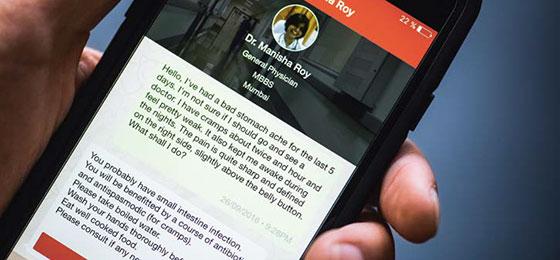Combating health paranoia on the Internet

Many people aren't properly able to assess online information about their health. New research shows what assessment criteria they use, and how they can be helped. By Florian Fisch
(From "Horizons" no. 111 December 2016)
The general practitioner is no longer the first port of call when people take ill. "More and more people are making decisions on their health alone, outside any kind of medical consultation", says Nicola Diviani of the University of Lucerne, who is studying how people get online information on their health. Instead, patients look for diagnoses and second opinions on the Internet.
This can increase one's autonomy and save health costs, but it also has its drawbacks. In 2015, the Federal Office of Public Health (FOPH) assessed the health competence of 54% of the Swiss population to be between 'problematic' and 'insufficient'. Switzerland is in the lower mid-table when compared to the rest of Europe. The Netherlands are top with 29%, while Bulgaria is at the bottom with 62%. However, the FOPH maintains that Switzerland's poor ranking is primarily because of people's feelings towards inoculations, which can range from uneasy to critical.
It is this low level of health competence that is the main problem when looking for information online. Diviani has been able to confirm this in a systematic literature study. "The problem isn't finding the information, but evaluating it". People with a low degree of health competence assess websites of modest quality to be better than high-quality websites. Things become disturbing when people stop trusting public authorities, use search result rankings as quality indicators, or judge a website on the strength of its images instead of its content.
In a mixture of interview and questionnaire, Diviani furthermore found that the majority of her 44 respondents did not even question the quality of websites. Diviani finds this problematical, because "it's not possible to control the flow of online information".
Despite this, a kind of 'control' is the declared aim of the foundation Health on the Net (HON) in Geneva. HON gives certificates to websites that meet its criteria. The website krebsliga.ch of the Swiss Cancer League, for example, has been certified now for 18 years. Other websites, such as sprechzimmer.ch, are not certified. HON provides search functions to help people to find their way through the information jungle.
Discussion groups are better
But not all experts are concerned to the same degree about the health of the population. "It is a common mistake to treat 'the Internet' as a homogeneous whole", says Jennifer Cole of the University of London. "The individual's ability to evaluate critically the website or the organisation that has posted it is more important than their ability to evaluate the information itself. There isn't a single study that showed that people with low literacy act stupidly on health information they find on the Internet, and come to harm because of it".
Cole and her team evaluated the quality of information offered in three different discussion groups: on HIV, diabetes and chickenpox. They reached the same conclusion in each case: "Most of the information assessed in this study was considered to be of reasonably good quality". Cole further adds that "online forums are better because users can see how others reacted to the information. Did they agree, disagree, urge caution etc.?" One prominent example is the mailing list of the Association of Cancer Online Resources (acor.org). There, cancer sufferers and their relatives have been giving each other advice for over 20 years. According to its founder, Gilles Frydman, people sometimes also demand proof for claims that people make on the site.
Diviani and Cole agree that education and the quality of information on offer are important. But Cole would like to see more discussion instead of the presentation of one-sided, static information, even in the case of controversial topics such as inoculations. "If people can talk to others about their concerns, the majority view is likely to be the sensible one".
Florian Fisch is a science editor at the SNSF.
N. Diviani et al.: Exploring the role of health literacy in the evaluation of online health information: Insights from a mixed-methods study. Patient Education and Counseling (2016)J. Cole et al.: Health Advice from Internet Discussion Forums: How Bad Is Dangerous? Journal of Medical Internet Research (2016)